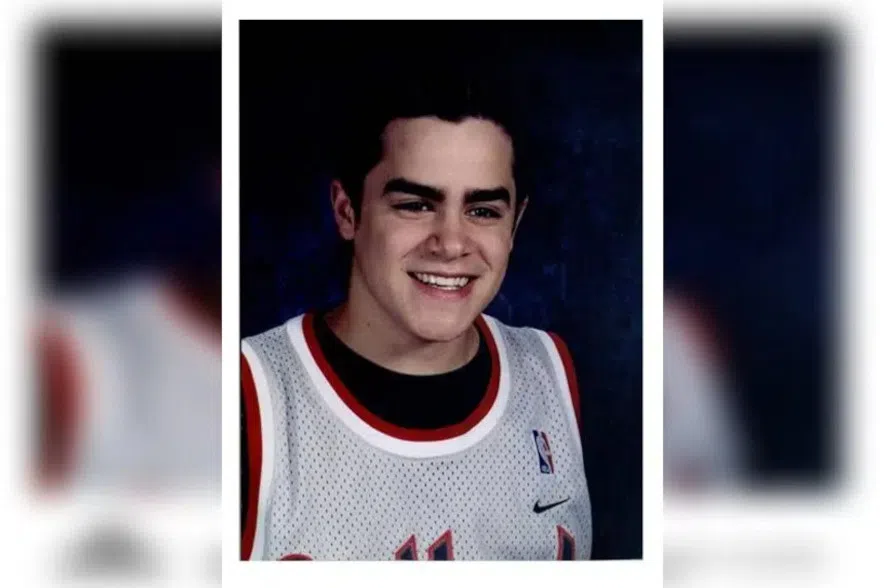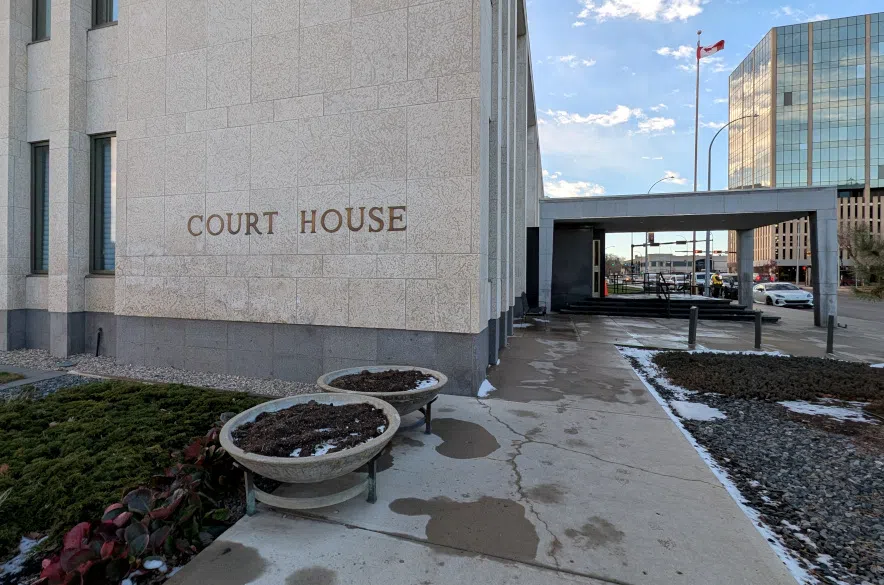The standard of “beyond a reasonable doubt” was emphasized by defence lawyer Andrew Hitchcock in his closing argument at the Misha Pavelick murder trial on Monday.
The accused in the case was 17 at the time of the killing in 2006, so he cannot be publicly named, as per the Youth Criminal Justice Act. Witnesses who were under 18 at the time are also not being named.
In his argument, Hitchcock reminded the jury members of the seriousness of their role, to remember their oaths and to apply the law.
“You have to be sure. If you think it’s possible (the accused) did it, your vote is not guilty. If you think he probably did it, your vote is not guilty. If you think he’s the most likely of the four, or five, or six, your vote is not guilty,” he explained.
It was a statement echoed by Justice Catherine Dawson early on in her initial instructions to the jury, including the presumption of innocence and the benefit of doubt.
Read more:
- ‘So much blood’: Partygoers near Misha Pavelick recall the fights before he died
- Very pale: A last memory of Misha Pavelick at the trial for his murder
- ‘Screaming and running’: witnesses who were at the party testify at Misha Pavelick murder trial
Hitchcock spent a lot of time on Scott Nelson. Nelson was at the party with the uninvited group, pleaded guilty to and spent time in jail for stabbing Derek Enns at that party, and told court in this trial that the accused bragged to him about stabbing Pavelick.
Hitchcock called Nelson a liar, characterized his testimony as self-serving, and told the jury they shouldn’t consider the evidence he brought to them at all.
In his argument, Hitchcock pointed out that Nelson only told police about the accused’s brag in 2021, when he’d been questioned for hours about the murder by RCMP. Hitchcock said Nelson had every reason to lie, and threw the accused under the bus.
“To rely on evidence like that, in a criminal trial where you’re asked to find whether a citizen is a convicted killer, is beyond dangerous and you shouldn’t do it,” he said.
Without Nelson’s testimony, Hitchcock said the rest of the evidence doesn’t hang together and there are other explanations.
Hitchcock went through a number of the other witnesses, calling into question their evidence for one reason or another.
Two people who encountered the accused at Regina Beach and said they heard him say either “I stabbed a guy” or “We stabbed a guy” were too far away and their evidence didn’t match what’s known, according to Hitchcock.
He brought up Kayla Kemp, that she said she saw knives on the dashboard of the accused’s car, and that she’d heard the accused say he had a knife. But Hitchcock said there were reasons to doubt what she said — pointing to her evasiveness about a relationship with Craig Pratt, and that familial relationships meant she had a reason to protect Nelson.
In his arguments, Hitchcock repeated that those who were at the party talked about the chaos and pointed to the uncertainty between witnesses about things like even whether there was one fight or two.
Hitchcock often came back to memory and recall with the witnesses, that they were drinking, that it’s been nearly 20 years, and pointing out people’s memories can change when they discuss things and compare notes with others.
Twice in his argument, Hitchcock compared memory to a Polaroid camera, that the image can change depending on whether people are moving, or its been left out for years.
He also suggested that, if the jury found there was only one large fight, then they could find that the person who stabbed Pavelick— Hitchcock suggested Nelson in this — might have been acting in defence of their friend Andrew Perkins, who’d been attacked with a bottle.
In closing, Hitchcock said he understands the desire for justice in this case.
“What happened to Misha Pavelick was unimaginable. To die over a stupid fight over a high school girlfriend, it’s appalling and the people who love him have suffered immeasurably. I understand wanting someone to pay for that,” he said.
But he reminded the jury of their oath to apply the law and of the standard of reasonable doubt.
From the Crown
Crown lawyer Adam Breker led off the closing arguments on Monday.
As he did in his opening statement, Breker told the jury that all the evidence together should convince them the accused was the one who killed Pavelick, that he is the only person in that uninvited group who checks all the boxes.
Breker said there was strong circumstantial evidence the accused had a knife, that he participated in the assault on Pavelick, he confessed or bragged to Scott Nelson and others, and he went from excited and amped up to upset and accusatory once the group started to hear someone had died.
“(The accused’s) demeanour and his actions after the fact show, in our submission, someone with a guilty conscience,” said Breker.
He said any common-sense interpretation of the evidence would find the accused had a knife. He reminded the jury that a couple of witnesses heard the accused say he had a knife.
Breker put to the jury that the evidence showed there were two distinct fights, and that no one saw Pavelick hurt after the first one, so he had to have been stabbed during the second.
In his argument, Breker said it was a small group of boys and men who were assaulting Pavelick in the second attack, that everyone in the group was known and named.
“There aren’t other unknown figures in the darkness in this case. The evidence points to the people that were involved in this,” said Breker.

Nineteen-year-old Misha Pavelick was killed in 2006 at a grad party at Regina Beach, but nobody was charged in connection with his death until 2023. (Saskatchewan RCMP/Facebook)
Breker said court heard Nelson used the knife he had to stab Derek Enns, and Pavelick’s DNA was not found on that knife so it wasn’t the one used to kill Pavelick. He said, back at the cars, Nelson wasn’t hiding the fact that he’d stabbed someone, and that’s when he said the accused began to brag too.
“In our submission, (Nelson’s) testimony had the unmistakable ring of truth,” said Breker.
He said Kyle Edwards followed Nelson and Enns, with some witnesses saying he was involved and some saying he wasn’t.
He told the jury that Andrew Perkins was hit with a bottle for a second time during the second altercation, which dropped him out of the fight.
With Dustin Scudder, Breker said there was little evidence he was assaulting Pavelick, and he asserted that when Scudder was on the stand, he was forceful when he said he didn’t stab Pavelick and didn’t want to be part of the violence.
Breker told the jury, out of the group, that just left the accused and Craig Pratt.
He said, unlike the accused, there was no evidence Pratt ever had a knife on his person, he wasn’t heard threatening to use a knife on a tent, and there was no evidence of him actively participating in the fight with Pavelick.
He encouraged the jury to work through the list of names themselves, believing they’ll come to the same conclusion.
Breker reminded the jury what multiple witnesses had said, that by the time the group started back to Regina — and after word started to get around someone may have died — that the accused started to act angry and upset, and ran off into the night when the car he was in stopped on the side of the highway.
Breker told the jury that, if they believe the accused stabbed Pavelick, then they have to come back with a verdict of guilty — that Pavelick being stabbed in the chest proves the intent for murder.
“Think about the frame of mind required to plunge (a knife) into someone’s chest, deep enough to enter the centre of the heart. To swing a knife at a person like that, that type of commitment, someone already bloody on the ground,” Breker said.
And he told the jury that, if they don’t believe the accused was the one who stabbed Pavelick, then he should still be convicted of manslaughter because Breker said there was “no doubt” the accused was part of the group assault in which Pavelick was stabbed.
Court will reconvene on Wednesday morning for the bulk of Dawson’s instructions to the jury, then the jury could go into deliberations that day.
Editor’s Note: This story has been updated to correct an error in Enns’ last name.











